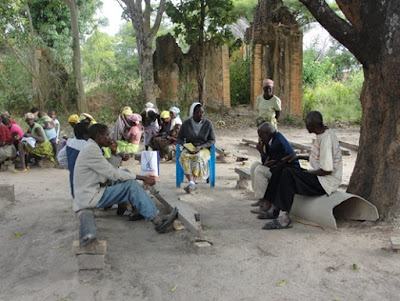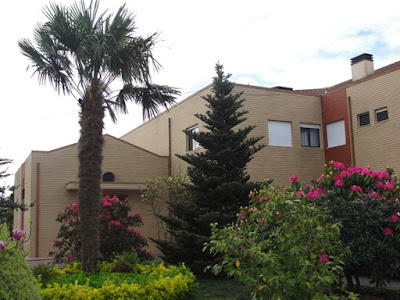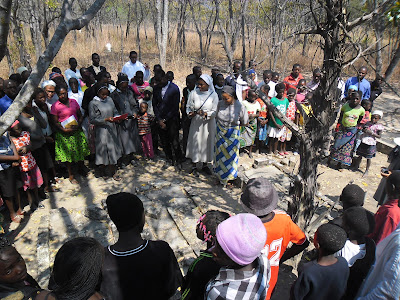Angola
Our mission history in Angola is marked with lots of hard work and sufferings.
On March 6, 1931, the pioneering Sisters, Sr. Alberta Fischer, Sr. Adriana Kästle, Sr. Anthusa Kindl and Sr. Veremunda Fürst, arrived in Ganague, South of Angola. On the following year, with our Sisters, Ildephonsa Behr, Nazarina Lechner, Frowina Hutter and Isberga Gruber, Cuchi mission was founded, followed by the Cuvango community: (Sr. Dietlinde Kleinlein, Sr. Gebtraud Grimminger, Sr. Hadmunda Hollik and Sr. Regulinde Reiter). The Sisters were invited by the Congregation of the Holy Spirit, to take care of the orphans and the intern girls and their formation, as well as catechism, pastoral and nursing care. These communities were part of the Windhoek Priory.
The three communities worked with the priests of the Holy Spirit and later on with the Redemptorist priests. At the beginning of the World War II, the German Sisters were expelled. But because the Superior of Cuchi hid all their passports, it was impossible for them to leave.
After WW II, the community of Cuchi was strengthened with the presence of other Sisters. In 1967, four of our Sisters, invited by The Singeverga Abbey and the Bishop of Luso, who was also Benedictine, started one community in Cazombo, east of Angola, near Congo. This foundation was done from Portugal and the community belonged to the Baltar Priory.
In the year 1972, the mission in Serpa Pinto, now Menongue, capital of Kuando-Kubango province, was opened.
It was very difficult that time because of the fight for independence which was everywhere. After the declaration of Independence, twenty-seven years of civil war followed. In 1975, our Sisters were advised to leave Angola. Then the Sisters of Cazombo community left followed by the Cuchi and Serpa Pinto communities.
In 1977 three Sisters returned to Angola and were working in Menongue. Meanwhile, the need of having a house in Luanda was getting stronger. How could it be possible to install a community in the Capital? Thus in 1982 a community were opened on the 10th floor of a building which was not very easy due to the prevalent lack of electricity. The Sisters worked at the Episcopal Conference and the National Caritas. In 1991, St. Andrew's convent was founded in Petrangol district, periphery (outskirts) of Luanda which served as the formation house. Later on, the sisters were able to acquire two small houses, annexed, at the center of the city, where the sisters of St. Benedict community lived until 2013. From the sale of St. Andrew's house, it was possible to acquire a land in Kikolo where a convent and formation house were built.
Already at the time as the Sisters were living in Cazombo, there were young ladies interested in our way of life. The fruit of work on vocation promotion is our Sr. Teresa Maria Umba Cutaneguera, the first African vocation in our Congregation. On the 80's the Angolan formandees had their formation in Nairobi. In after years, the formation was moved to Luanda. Recently, the plan is that part of the formation of Angolan young formandees is to be spent in Windhoek, for them to experience at the very beginning of their formation the internationality of our congregation.
The communities of Angola were part of the Generalate District in 1983. Since 2003 the Region of Angola is affiliated to Torres Novas Priory.
Catechesis in the ruins of Cuchi
Our Mission in Angola at present
Kikolo/Luanda
Kikolo is an area of 2,4ha acquired in 1998. At that time it was outside the city, but like Luanda, it's growing rapidly. Now the community is at the middle of a very poor population. It is the only religious community present in St. Elisabeth parish. The sisters are very much involved in many pastoral works. In our terrain there is a school functioning for the formation of the youth and adults, which was initiated by Caritas. We assumed the running of the said school from 2014. Since then, seven classrooms were constructed and some other improvements were being made, so much the construction as well as the pedagogical organization.
School in Kikolo
The community is composed of seven Sisters who are dedicated in pastoral education in our school with more than a thousand students. One Sister is working as a nurse in the public hospital. Apart from their collaboration in the Cathedral parish, some of the Sisters travel to Cuchi every Saturday to gather the people for Catechism and prayers, in the middle of the ruins of our old houses.
Kuito
In 1998, the community in Kuito, Capital of the Province of Bié, was opened. The city was devastated during the civil war. The fact that in Kuito there are plenty of schools wherein the sisters as well as the young formandees who are preparing for consecrated life, could study, is beneficial for the small community.
Waku-Kungo
The Bishop of the Sumbe Diocese invited us to work in Waku-Kungo. In 2011 a land was given to us. After a long process to obtain the land title, we began to construct a convent. Waku-Kungo is situated between Luanda and Menongue, which favors the easy communication of the communities. The plan for this community is to dedicate to the human and religious formation of the village population, with its preference on the women formation.
Construction of new Convent in Waku-Kungo
Portugal
The beginning of our mission in Portugal is connected with the history of the Congregation in Angola.
The Sisters of Cuchi wanted to have Portuguese speaking sisters in the community. Sr. Cristina Eloy da Rosa, a junior Sister, was sent from Sorocaba Priory to Cuchi, where she had her perpetual vows. The Abbot of Singeverga, who was visiting the monks in Moxico, came for the preparation for Sr. Cristina's final profession. D. Gabriel de Sousa witnessed the dedication of the Sisters and appreciated their good spirit. Thus he asked from the Mother General, Mother Maria Lucas Rauch, to send Sisters for the foundation in Portugal, to prepare vocations for Angola.
On June 9, 1961, feast of the Sacred Heart of Jesus, the "new" convent in Bande was inaugurated. The pioneering Sisters were Sr. Liobolda Fetsch, Sr. Martinha Rodrigues, Sr. Regina Lansang and Sr. Wiltrud, now Monika Zahnbrecher. The farmstead of Bande was given in testament to the Singeverga Abbey with religious finality. There were existing two small farm houses, two houses for the caretakers and 11.500m2 of land. The Abbey would only hand it over to us with the condition of opening a novitiate for the formation of missionaries. And the first candidates have come.
In 1967, four Sisters on board went to Cazombo, Angola, for the foundation of a community.
Consequently, the Congregation is recognized as Missionary Congregation in Portugal.
The Sisters have had struggled so much to obtain their sustenance. They opened a school in Paços de Ferreira, a neighbouring place of Bande. The Sisters collaborated with the Social Center in Baião and gave lessons in one "telescola", a way of learning via television wherein the pupils are accompanied with a "teacher" as they followed a program in the TV, giving lessons on basic subjects. But these two initiatives ended in frustrations.
In 1967, a new offer arose in Paredes, 17 km from Bande that promises a better future. They started a school and some of the Sisters transferred from Bande to Paredes. A year after, the sisters bought a house in Baltar with vast terrain where they can construct a new school.
In 1972, the three communities, Baltar, Bande and Cazombo formed as one Priory with Sr. Lúcia Jörger as the first Prioress.
April 25, 1974 - the military coup brought down the government. The new regime of the government threatens the existence of private schools. In our neighborhood a state-owned secondary school began to function. In June 1977, the sisters were obliged to close the school.
A group of Catholic doctors, led by a priest, wanted to open in our school building a Psycho-therapeutic Center for children with intellectual deficiencies. In June 1977, the school was handed over for free to the association, EMAÚS. Our house in Bande was returned to the Singeverga Abbey.
In 1975, the Cazombo community have had to withdraw due to civil war. The Priory of Baltar was suppressed and the community directly was made a dependent of the Generalate District.
From 1977 to 1983, only the community of Baltar existed in Portugal. Two sisters, Sr. Plácida and Sr. Maria Goretti, were working at EMAUS, center for the mentally handicapped. Other sisters were dedicated to pastoral work or studying.
In 1983, Sr. Edhilt Fasel was nominated Superior and in charged to search for another place of work. D. António Francisco Marques, bishop of the Diocese of Santarém, invited the Sisters to administer "Casa de Repouso", the Nursing Home in Torres Novas, pertaining to Santa Casa da Misericórdia. They worked here from 1984 to 2011.
The sisters received a land beside the Casa de Repouso for the construction of the Monastery and a Nursing Home.
In 1966, Torres Novas became the Priory house. A year after, the communities of Spain integrated to the Priory.
Bande - the first House in Portugal
Our mission in Portugal at present
Torres Novas
St. Benedict's Monastery is the Priory house. The community is dedicated in taking care of the elderly. Our nursing home has its capacity of 37. It is a service that requires lot of dedication and it responds to the great necessity of a society which is more and more aging.
In our garden, we have plenty of fruit trees, legumes and vegetables.
Every Sunday, our Chapel is filled of Mass goers. We are in good relations with the parish, the Diocese of Santarém and the city.
Monastery São Bento - Torres Novas
Baltar
The four sisters of the community in Baltar are all retired. They are active in pastoral work: Catechism, Liturgy, Parish Council and Ministry of Communion; Visiting families, Vicentinos, Sacristy and Feasts. The sisters are very much appreciated by the population.
Convent of Baltar
Spain
The history of our community in Spain is very special.
In 1914, a group of Spanish youth who were working in the Abbey of New Norcia, Australia, formed a religious association, which transformed into a "Pia Unio" in 1921. These young ladies, with private vows, called themselves "Benedictine Oblate Sisters".
In 1933, two Sisters from this group went to Belgium and had their Canonical Novitiate in the community of the active Benedictines in Maredsous. Two years after, which was in the year 1935, the "Benedictine Oblate Sisters" were approved as Diocesan Congregation.
Since 1962, their name was changed to "Missionary Benedictines of New Norcia." From 1978 the Congregation became part of the Benedictine Confederation.
In the Abbey, the Sisters had been working with children. Three of them, formed one community in the mission in Kalumburu (North of Australia) and dedicating themselves to the evangelization of the aborigines, together with the Benedictine Priests.
In 1964, six of the Sisters returned to Spain. They worked with special children in Madrid. From 1968 to 1979, there was an existing community in Barcelona.
In 1973, a day care for children on the ground floor of the building was opened in Parla, a neighbouring city of Madrid. The Sisters were living on the third floor of the same building. After four years, a residence for students was opened in Carabanchel, Madrid, with a community of the Sisters at the house next door.
Due to absence of vocations, the Congregation of the Benedictine Missionaries of New Norcia, decided in their General Chapter on 1981, to ask for integration to the Congregation of the Missionary Benedictines of Tutzing. The petition was accepted in our General Chapter of 1982.
After the probation period of two years, the integration was made, with the approval of the Holy See.
The Sisters of the Manila Priory helped a lot during the integration period. They started on pastoral work with the Filipino migrant workers in Madrid and Barcelona. There were then three communities in Spain: in Madrid where the residence for female students is; in Parla with the day care for children and in Barcelona, very much dedicated on pastoral work with the Filipino migrant workers. In Barcelona, they formed a group of Oblates of St. Benedict, very faithful to us, even though there were no resident Sisters since 2000. A Sister from Madrid or Portugal regularly visits the Oblates for their formation. In Madrid there is also a continuous contact with the Filipino community and a group of Oblates.
Three countries, three histories, one Priory -great challenges, lot of efforts, big differences within one and the other reality, but the same ideal that unites us:









































































0 Comments